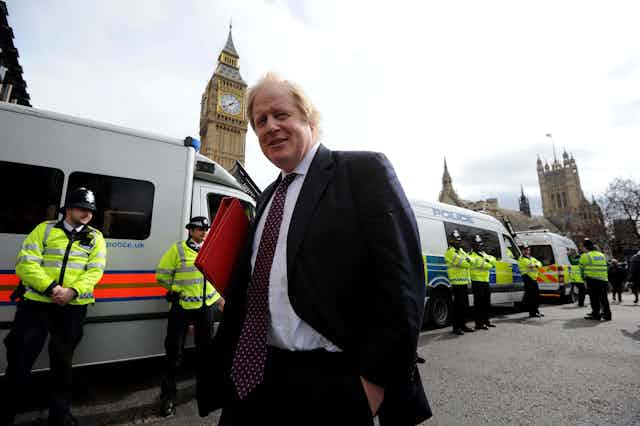Boris Johnson’s time as Conservative party leader has come to an end, after a chaotic week marked by rebellion from his cabinet. But despite the wave of resignations and calls from his top ministers to step down, Johnson has held on as long as he could.
Throughout, he has claimed he had a “mandate” from Conservative voters who delivered him an 80-seat majority in the 2019 general election, to stay on as prime minister. Even into his resignation speech, Johnson spoke to “the millions of people who voted for us in 2019 … Thank you for that incredible mandate.”
Johnson’s few defenders have decried the revolt from his ministers as an anti-democratic “coup d'etat”. Pro-Brexit think tank the Bruges Group tweeted that Johnson was being “forced out” undemocratically. At the time of writing, Johnson is still in post, and planning to stay as caretaker prime minister until he is replaced. Whether that happens remains to be seen, but if it does, it won’t be because of a “mandate” directly from the people.
Unlike the US, with its famous constitution codified into a single document subject to careful scrutiny, the UK’s constitution is a collection of laws and rules which have emerged over time. In the US, the head of state is the president, elected every four years with clearly delineated powers and responsibilities.
In the UK, the head of state is the monarch. However, a lengthy series of processes over centuries have incrementally stripped the monarchy of direct power. Instead, executive power is delegated to ministers and, first among equals, the prime minister. They form the government of the day, and effectively govern as representatives of the Queen, who is constitutionally required to remain steadfastly neutral in political affairs.

So, how are prime ministers selected, and where do they actually get their power?
In essence, the House of Commons is supreme. Theoretically, every five years (though often more frequently) the membership of the House of Commons is put to the people. Voters are asked to choose someone to represent them as their member of parliament (MP).
An MP represents one of 650 constituencies, most of which have an average of around 70,000 voters. The monarch then, after an election, invites the MP with enough support from within the House of Commons to the palace and asks them to form a government. They are then to select ministers, drawn from the body of MPs in the House of Commons and the peers in the House of Lords.
Party power
This, in essence, means that power is held by the MP who can command the support of a majority of other MPs. This is somewhat complicated by the party-political system. Naturally, politicians of roughly similar perspectives arrange themselves into broad camps. These camps have developed over time into political parties, where individuals selected by their party stand for election under that party’s banner and published manifesto of agreed policy positions. Naturally, voters tend to gravitate to parties which better reflect their individual views and cast their votes accordingly.
In the UK, the party system has emerged such that the leader of the victorious party in an election typically is invited to form a government. There are some exceptions to this. For instance, Nicola Sturgeon, leader of the Scottish National Party, is a member of the Scottish parliament and not an MP at Westminster.
Some elections produce a “hung Parliament”, when no party has enough MPs to form a government. In these instances, parties must work with MPs from rival parties to form a government. For instance, in 2017 the Conservatives forged a confidence and supply agreement with the Democratic Unionist Party, and in 2010 went into coalition with the Liberal Democrats.
The party system, in conjunction with the presumed qualities of a given party leader, is a powerful draw at the ballot box. Many people may vote based on the leader or values of the party. But, whether they realise it or not, they are actually voting for an individual representative, not a government or PM. This has long been the case.
In the Conservative Party, leaders are chosen from within the parliamentary party. Candidates must be nominated by at least eight MPs and, through rounds of voting, the two left standing are put to the membership of the wider Conservative Party. If the Conservatives control a majority of seats in the House of Commons, that leader will be able to form a government.

In an important speech in 1774, one of the founders of modern Conservatism, Edmund Burke, said that, “Your representative owes you, not his industry only, but his judgment; and he betrays, instead of serving you, if he sacrifices it to your opinion.”
In other words, we elect representatives to act, based on their own judgement, on our behalf. We do not elect automatons who are merely there to vote according to the wishes of constituent party members or party voters. They must do what they feel is best for their community and the country.
This not only applies to how they vote on specific pieces of legislation, but is essential to how they select party leaders and, in turn, prime ministers. MPs grant power through their support. If that support evaporates, the government falls.
This is not new. In 2019, Theresa May lost the support of the majority of MPs in the House of Commons and was forced to tender her resignation to the Queen. In fact, since 1940, nine prime ministers have assumed office between elections.
In short, Boris Johnson’s mandate never came from the 14 million votes that his party representatives won on December 12, 2019. It came from the elected MPs. And he has resigned because that support of free-thinking individual representatives has now been withdrawn.

